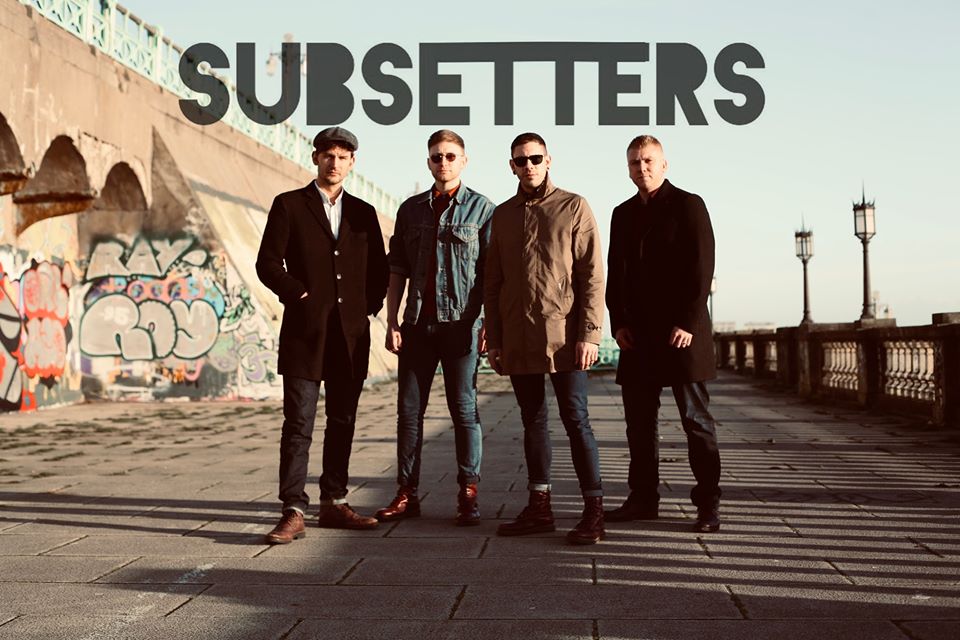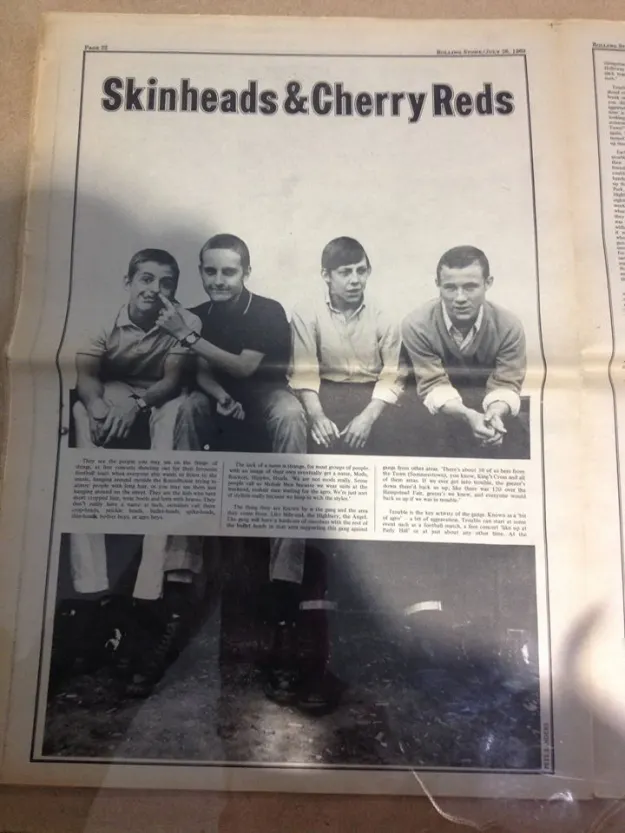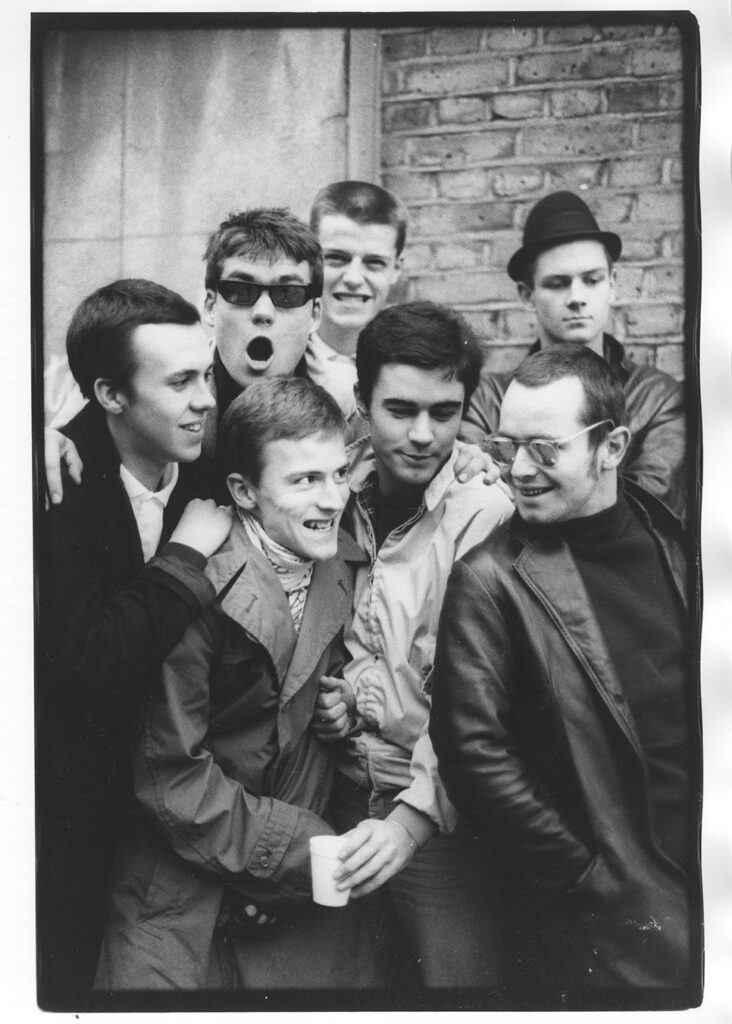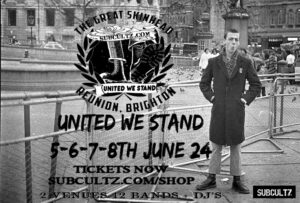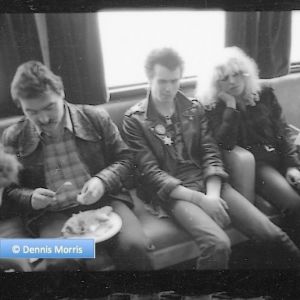
RON
| RON WATTS PUNK PROMOTER | |
| Friday 17th November 2006, 30 years since Punk detonated, and I had the pleasure of sharing a few drinks with Ron Watts in my home. Ron promoted many of the early bands, and organised the now legendary Punk Festival at the 100 Club on the 20th and 21st September, 1976. Ron’s just published a great book which documents those heady and (for those lucky enough to have been there) exciting times. I switched on the tape recorder, put some wine on the table and off we went, talking about our mutually favourite subject. Music! I hope people will find this interview as interesting as I did, he’s a top bloke with some great memories. Rob Maddison, Tamworth, 19th November 2006. 100 Watts, a life in Music. Written by Ron Watts and forward by Glen Matlock. ISBN 0-9543884-4-5. Available from Heroes Publishing, the Internet (it’s on Amazon) or even a bookshop! |
|
|
RM) Ron, firstly, why did you write the book? 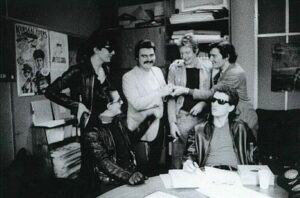
|
| RM) Were the early Punks, like Siouxsie, middle class students? If so, how did they feel when Punk was taken up by the masses? Ron) No. The early Punks were solidly working class. There was the art college mob, they weren’t numerically very strong, but they were the most vivid people, because of their appearance. They set the standard, the tone, you know? But immediately behind that, by the time of the punk festival of ‘76, the bulk of the audience was being formed by young, working class people and they took it to their hearts at once. RM) Were the movements roots biased towards the fashion element or more towards the music side, or was it one package?Ron) The fashion and art side, you know, was where Siouxsie was coming from. They took it very seriously, it was a new movement and they only had the one band to start with. It was very arty, but it was an art movement that worked. If you’d been there the first night I put the Pistols on, I think it was March 30th 1976, and you saw the Bromley Contingent coming in! They didn’t all come at once, they come in dribs and drabs. Each time, it was breathtaking and jaw dropping just to see them walk through that door.RM) Were contemporary Londoners shocked by the appearance of the early Punks? Ron) Initially, yeah. They’d got used to it by the end of that year. But initially, like in the early months, absolutely.RM) The summer of ’76 is famous for its heat wave. I bet you’ve great memories of it? RW) In that summer, and remember that it was the hottest, the best summer in living memory, it was the summer, people still talking about it now, and nothing was happening, everybody was asleep, you know. Anyway, this New Zealand film crew turned up to capture London. They’d been dispatched from Auckland to film London, in the summer. They were bright enough to cotton on to the movement, and they were haunting me! I mean, they got so many yards, so many miles of film, some of it’s not even been seen yet. All the main punk films, like the Rock ‘n Roll Swindle, The Filth and the Fury, were relying on their footage. They were amazed when they got their first, full on, Bromley Punk. They could not believe it. They said “You guys are 200 years ahead of New Zealand!” RM) Were you interested about the politics in Punk? Ron) I tried to keep it at arms length. I wasn’t interested in sub-divisions.RM) What about The Clash? Ron) Didn’t know that they were! (political). I think they were just trying to make it, I mean, they latched on to it. The Pistols had got a lot of the market wrapped up with their attitudes, so The Clash had to find some attitude, and they probably cooked it up with their manager, I reckon. What attitude can we have? Well, the Pistols have got this, that and the other and they found the one that they could go for. RM) I’ve read that the purists hated them, but I loved The Jam. They flirted with politics early on, and then really got involved, with Paul Weller joining Red Wedge later. Ron) The Jam were some of the biggest winners out of Punk. There was such a lot of talent in that band. That band was so tight.RM) Did you get more involved with them once they’d started to get bigger? Ron) They wanted me to help them with their American tour, by going ahead from city to city publicising it. But this was ’77, and I was amazed that their manager John Weller had asked me, and I would’ve loved to have done it. But, I was at the height of my promoting career, and I realised that. So I said “No, I’ve got to stick with this.” RM) The Jam always felt like a band that, as a fan, you had a stake in. Ron) I tell you what, they did a show for me at the 100 Club, when they’d been doing really huge venues like the Hammersmith Odeon. They’d always said, when we get there, we’ll come back and do one. They ended up doing three for me. One at Wycombe Town Hall, one at the Nags Head, which is a pub, you know! And, the 100 Club. They were really good like that, and I appreciate what they did for me and I love ‘em to bits.RM) It’s weird that there was all that acrimony between those people, and even stranger that Rick, and now Bruce, are playing in a Jam tribute band. (The Gift).Ron) Good drummer. I think, and this is my opinion, as I’ve no proof of it, that the girls all used to go for Bruce Foxton. The band was great, and they knew the band was great and they loved Paul Weller. But, in their hearts they all fancied that they’d get off with Bruce Foxton. When I did the box office at the 100 Club, there’d be all these girls turning up in school uniforms. I’d be saying “How old are you?” and the answer was always “19!” Am I really going to sell these girls tickets?!RM) I read somewhere, years ago, that Sid Vicious and Paul Weller had a fight after arguing about the Holidays in the Sun/ In the City riff. Did you hear that one? Ron) No. I can’t see that. Paul Weller was from a tough, working class background. A fight between him and Sid Vicious would have lasted about 8 seconds. He would have dealt with Sid in no time at all. It didn’t happen. Sid would need to have been tooled up, and I’ve had to fight him 3 times when he was. And I’m still here. Sid came at me with a chain, once. I confiscated it, and wish I still had all these weapons, as I could put them up for sale at Christies, couldn’t I?! And I saw Sid with a knife, threatening Elle, the singer out the Stinky Toys with it. I took that off him and gave it to Malcolm Mclaren. Wish I’d kept it. RM) Ron, did you have much to do with Rock Against Racism (R.A.R)? Ron) Only in as much as I endorsed it. And, I wouldn’t have any racist behaviour, as it says in the book, in any of my venues. I just wouldn’t. No way, I mean my bouncers were black, a lot of my acts were black, and I wasn’t going to have it. There were a few occasions when it surfaced, and I did the natural thing and let the black guys sort it themselves.RM) Empowerment? Ron) Yeah. At Wycombe Town Hall, the British movement guys were having a go at my bouncer, Gerry. One black guy against twenty or thirty of them, so I said to him “I’ll take your position, don’t be long, go down the pubs and get your mates.” And he come back in with a dozen big black lads. I said to them, “Look, you’re here to look after Gerry, not to kill these white guys.” So, Gerry stood in front of them, and there wasn’t a word out of them again! They moved out of the way, and went down the other side of the hall, these bullies. They saw the odds evening up a bit, and given the other 8 or 9 bouncers I had stood in the hall, we would’ve murdered them. RM) Jimmy Pursey went on-stage with The Clash at R.A.R in Victoria Park. Was this damage limitation on Pursey’s behalf? He seemed to get his fingers burned when the Skins affiliated to Sham 69. Ron) Exactly. And I don’t think he liked that one little bit. See, now, Jimmy Pursey is another guy, like Paul Weller and Joe Strummer, probably all of them at that time. Underneath he was a much nicer person than the media, and the world, would realise and portray. He was an alright geezer and he caught the wrong end of the backlash. People were believing what he was portraying and singing about, and that wasn’t necessarily him!RM) Did Sham 69 dance a bit to close the flame? They could be perceived as “rabble rousing”, if you like. Ron) They were looking for something to hang their stick on, if you like. The Pistols found it in one. Joe Strummer looked around with The Clash and thought about it and did it, you know. The Jam done it through their potent mix of soul and punk, and I think Jimmy Pursey thought he’d go with the hard boys in the East End. The skinheads, and the mobsters and the ruffians, you know. RM) Musically, Sham 69 were similar to the Pistols… Ron) Yeah, closer than some. I liked Sham 69, they were alright. I think Pursey is another guy who hung his hat somewhere, and that hat got on the wrong peg. |
| RM) How fast did Punk spread throughout 1977? Ron) Well, it got going in ’76. The Wycombe Punks, because they had me to promote at the Nags Head, got their first Sex Pistols gig there on September 3rd, which was actually 3 weeks before the 100 Club Festival. They were on the case really early. In ’76, Wycombe and the surrounding towns were full of Punks. By the end of that year, they even had a black Punk in Wycombe, a guy called Marmite. He had black hair, with a silver zigzag stripe in it. By ’77, it was all up and running everywhere. By January or February 1977 almost everyone under the age of 18 or 19 was a Punk.RM) When did the press really get hold of it? Ron) Then. But they were on to it before the Bill Grundy Show, the Punk Festival was before that show and from then it was just….you know. I used to get phone calls, from NBC and CBS in America asking if anything’s going on, or coming off, could you let us know. RM) That’s odd, being as the Americans claim to have invented Punk! Ron) They were a year or two ahead. It’s like most things. It’s like the Blues. We had to take the Blues back to America for White America to know about it. Cream, Rolling Stones, Fleetwood Mac, those sort of people. RM) America’s too big and too diverse. It couldn’t host youth movements like Punk and 2-Tone.Ron) No. It had to come from somewhere else. I mean, in New York it was a club scene, in Britain it was a national scene. RM) What did you think of those American bands?Ron) Some of them were really good. I didn’t think New York Dolls were as good as bands like Johnny Thunders and the Heartbreakers. They were probably the best Punk band I ever saw, actually. RM) And Blondie? Ron) Well, Blondie. The bass player, Nigel was a guy from the Nags Head. Tigger, we used to call him. That was his name round Wycombe. He played at the Nags Head before he was in Blondie. I’ve got to say that Tigger and Blondie didn’t get on. Maybe she fancied him, and he didn’t fancy her! RM) He would’ve been the only British male in the late ‘70’s who didn’t, then?! Ron) Perhaps he knew something we didn’t!RM) Back to the serious stuff, Ron. The Clash flew to Belfast, had some nice photos taken near some barricades and murals. Then they flew home. No gigs played. What do you think about all that? Ron) Well, it’s up to them. Sometimes, promotional events can take over. You can be wise after the event, it might have sounded like a good thing at the time. Who knows, I mean, it might have been sincere. I didn’t see them as a band who had very political motives outside of the publicity. I’m not saying they didn’t have a heart, but sometimes publicity sows a life of its own, you know.RM) If they’d played, this would never have been an issue with people over the years. Ron) No, but they would do benefits and things, R.A.R, and one just before Joe died, for a fireman’s benefit. RM) It’s ironic. The Pistols and Strummer/Jones last gigs in England were both strike fund benefits. And the Pistols, apparently, never cashed their cheque from that Christmas Day one. Ron) I wasn’t a party to any of that, but yeah, that was a good gesture. A lesson. A guy came down to interview me, and he lived near Joe Strummer. Lived in the same village and he was a long time journalist. He said that he thought that Joe Strummer had a lot of heart, and it was very typical of him that he’d go out and do a benefit as The Clash, but commercially would only do The Mescalero’s. RM) Back to the Pistols, now Ron. What was their early live sound like? Ron) I’ll tell you something now that I’ve never told anybody before. Musically, when the Pistols started, I thought that they were, or sounded like, a youth club heavy metal band. Not the songs, or the vocals, or even the presentation but the actual sound of the band. It wasn’t a weak sound, but it wasn’t particularly pokey. Within three months, they’d perked it up a lot. RM) How big an influence was Dave Goodman to their sound? Ron) He brought a lot of stuff to them. He gave them a lot of advice. He’d make them sound a lot more pokey, he’d get them to do things. I spent a lot of time with Dave Goodman, as when you’re a promoter, you’re there to open it up. And Dave used to arrive early, you know, he’d arrive at four in the afternoon. I’d give him a hand in with some of the gear, and we’d spend some time together as we’d be the only ones there for a couple of hours. I’d be answering the phone and stuff, doing other things like that, but I got to know that guy. He never actually spoke to me about Punk. He mentioned the Pistols, but he never actually spoke about the Punk movement. I wish I’d recorded all those conversations!RM) Did you always fill the 100 Club? Ron) Well, after the first couple of months, it filled out, yeah. I mean, the Pistols didn’t pull a crowd for about their first six gigs. We’re talking about 50 – 80 people, the Bromley Contingent and a few interested parties! RM) Some people must’ve come in to watch the Pistols out of curiosity? Maybe just walking by the club, then deciding to see what was going on in there, and finding their lives would never be quite the same again? Ron) Yeah, I think that younger people who come down to see it would change. They’d come down the first night with long hair and flares, and by the third night they’d seen them they’d come down in drainpipes and Punk haircut, you know? RM) What about the other clubs, Ron, like the Roxy? Ron) Went to the Roxy, yes, many times. It was a bit of a pokey hole actually. The Roxy didn’t last long. The Vortex I went to. The stories I used to hear about that place! It was more of a disco crowd, actually. Rent-a-Punk, you know? It wasn’t for the faint hearted, not very savoury! RM) Did you get to read many of the fanzines? Ron) Yeah, I did. I used to see them all. We had one out in the Home Counties called the Buckshee Press, which is a piss take of the Bucks Free Press, of course there was Sniffin’ Glue, we used to see that at the 100 Club all the time. There were others, too, I came across them all over the place, actually, some of them were just one issue, you know, and just a couple of pages.RM) Did you know Mark Perry and the music hacks the time? Ron) Yeah, I knew Mark. Caroline Coon, too. Caroline has been very kind to me in her books, and things, you know. In fact she blamed me, or congratulated me for the whole of Punk in one of them, special thanks to Ron Watts, and that’s nice! Caroline was the first dedicated journalist who wanted to see Punk happen. And, I’m glad in a way that it happened for her, too, because she put her money on the table, you know? Same as I did. She ran that Release thing, which got all the hippies out of jail for cannabis. She was ahead of her time, I mean seriously, you can’t lock someone up for 6 months for smoking cannabis! RM) Changing tack again, Ron. What did you think of Malcolm Mclaren? Ron) I like Malcolm personally. No doubt, you know, I’m not just saying that. On first impressions he looked like an Edwardian gentleman. He’d got that off to a tee, I’d never seen anyone look like him, actually. I never had any bad dealings with him, and he was always very straightforward.RM) People either loved or loathed Mclaren. John Lydon isn’t a fan. Ron) Yeah, I think it was more of a financial thing, but I mean, John Lydon should also remember that without Mclaren he probably wouldn’t have been in them. Mclaren set the scene going, I was the first to pick it up, from that, before recording deals, but he never stuffed me like he stuffed the record companies. They made a lot of money, initially.RM) Did the record companies drop the band so willingly because it was Jubilee year? Ron) Well, the Pistols were full on and did it. I mean, “God Save The Queen” become one of the biggest selling British hit singles, didn’t it? It’s still selling now! And they wouldn’t let it on the shelves, would they. Bless ‘em! RM) You were on the legendary ’77 boat trip up the Thames, when the Pistols played and Mclaren got arrested. What was that like? Ron) It was lovely! You should’ve been there, honestly. The band were ok, they just did their normal gig. I enjoyed seeing people that you wouldn’t expect, talking to each other. When you’ve got the boss of Virgin, that business empire, talking to Sid Vicious, can you imagine what sort of conversation they had?! I’d loved to have taken a tape recorder in there! RM) Do you think the police raid on the boat was planned? Ron) I tell you what, I was amazed at that. I was actually on deck, and the boat was going downstream, back towards Westminster Pier. The Pistols were playing, and it got a bit jostley. You know, a bit of charging about in a small space ‘cause it wasn’t very big, the boat, really. So, I went out on to the deck by the railings, and a couple of other people come and joined me. There was plenty of food and drink, and I had a beer and a chicken leg or something, you know. And I’m looking and I can see these two police boats, and they were a way off. Downstream, I could see two more police boats, and they were a way off, too. I carried on eating the chicken and drinking the beer, looked round, and they were all there, together, at the same time! I mean, the degree of professionalism was just amazing! And then they were on that boat, in force, like about twelve or fifteen coppers, in moments. The boat was quite high sided, but they were up there. And you know what they were doing, they were up there and on that boat and we were escorted into the Westminster Pier basin.RM) Then Mclaren was nicked. Do you reckon he did just enough to get the publicity of an arrest without being charged with anything serious? Ron) I saw that. He got a lot of press out of it, yeah. He knew. Everybody turned to me, to try and sort it all out. One of them was a Countess! RM) Ron, you mentioned that no other bands were on the boat. Was there a real rivalry between these new bands at the time? Ron) The Jam were the young upstarts according to the Pistols, you know. The Clash were their biggest rivals at the time. The Damned, they had no time for.RM) Why don’t The Damned get their due credit? In my opinion, they should. Ron) I don’t know. A lot of people say they’re just a Punk cocktail act. You don’t see a lot about them, and yet they were the first to get a single out and they could play. Scabies could play. Brian James come up brilliant, but then he’d have done anything, if they’d have asked him to join Led Zeppelin he’d have done that, and Captain (Sensible), well I like Captain.RM) Buzzcocks were, from what I’ve heard on bootlegs, a bit rough to start with. They really hit a rich seam once they got up and running. Ron) If the Buzzcocks could make it, anybody could. I wasn’t impressed, really. But what’s in the future’s in the future, you never know what is at the time. They blossomed. RM) And Magazine? Did you rate them? Ron) Yeah, I did. Brilliant guitarist, John McGeoch. And Penetration, they were a good band, and X-Ray Spex. RM) Which bands are you the most pleased to have seen play? Ron) Well, I mean, it’s all of them. But where do you start?! Alright, the Pistols and The Clash, definitely, yeah. The Jam – pleased to see them anywhere, anytime. I did enjoy the Damned at an early stage, but they’re not in the top 5. And Sham 69, and The Heartbreakers.RM) I heard “Pretty Vacant” on the radio in my car earlier today, and I got the old goose bumps. Does any of the music from that time affect you the same? Ron) All the early Pistols stuff, yeah!RM) What’s your view on Punk and Reggae getting married? Ron) Yeah, if people want to get together and cross pollinate ideas, then that’s alright. It was the underbelly, twice. You had the white working class and the black working class responding to each other at last! RM) Some Punk bands who had a go at playing Reggae were better than others. Ruts, SLF and of course The Clash all cracked it in their own styles… Ron) The worst Reggae act I ever saw, were The Slits. Actually, probably just the worst act! RM) Do you think that Punk and Reggae blending in ’77 was the root of Two Tone? Ron) Yes. I’m sure it came out of that. I used to have a lot of Reggae acts on in that club, aside from Punk and the Blues and everything. I’d put on Steele Pulse, or an American Blues artist like Muddy Waters, as long as it was what I liked. RM) Your best front men and women? Ron) I’m thinking about this one…The best oddball front man was Wayne County. Best front woman, from what I saw, Faye Fife.RM) You rate Faye Fife over Poly Styrene?Ron) You’re putting me on the spot there! I’d put them equal for different reasons. Faye used to put on a great act. They were perennially at the club and at the Nags Head. Because I had so many venues, when they were coming down again, I needed to know, because that’s three bookings to give them. It was always like, “get your diary out, mate, when you coming down?” If I gave them three bookings, they’d come down, and they could fill it out with other stuff, do the rounds. X-Ray Spex were good, too. Really good band. The Rezillos are still going, actually. RM) I watched a documentary on TV the other night about that Stiff Records tour. The one where they hired a train from BR. Ron) They did the first night for me, at High Wycombe, yeah. There were some funny people there! Wreckless Eric was at the Punk thing I did in Blackpool this year. It took me about an hour to recognise him. I kept looking and looking and vaguely remembered him. Not a nice bloke. RM) Here’s the last one, Ron. Punk lit a fuse for many people. I’m one (albeit two years late), the other people who contributed questions to this interview are others and there’s millions more. As Ed Armchair puts it, his fuse is still burning to this day, and has affected virtually every aspect of his life since it was lit. Do you have the same feelings about Punk as we do? Ron) Yes. I got going through that and it still survives. My first love in music was, and is, Blues. I see a lot of similarities between Punk and Blues. They both come from the underbelly of a society, and they’ve both triumphed against all the odds. They both spoke for their people of that time and place. They’ll reverberate forever. Punk freshened up a stale music scene and the Blues were the bedrock for twentieth and twenty-first century music.RM) Ron, thanks for your time and best of luck with your new projects.END |

